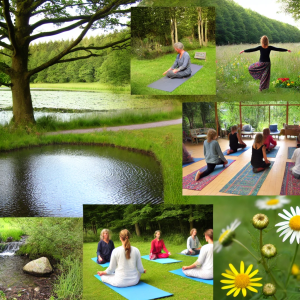By: Dr. Laura Bennett, Certified Reiki Master and Holistic Sexuality Counselor
Eco-spirituality is an emerging practice that combines spiritual growth with environmental stewardship, emphasizing a deep connection with nature. This holistic approach fosters a sense of unity with the earth, promoting rituals, meditations, and ceremonies held in natural settings. As more people seek meaningful ways to connect with the environment, eco-spirituality offers a path to personal and communal well-being, aligning spiritual practices with ecological consciousness.

Contents
The Essence of Eco-Spirituality
Eco-spirituality is rooted in the belief that nature is sacred and that human beings are an integral part of the natural world. This perspective encourages individuals to honor and protect the environment as a spiritual duty. By integrating spiritual practices with environmental awareness, eco-spirituality fosters a harmonious relationship between people and the earth.
Core Principles of Eco-Spirituality:
- Reverence for Nature: Viewing nature as a sacred entity that deserves respect and protection.
- Interconnectedness: Recognizing the interconnectedness of all life forms and the impact of human actions on the environment.
- Sustainability: Committing to sustainable practices that preserve and protect the earth for future generations.
- Mindfulness: Practicing mindfulness and presence in natural settings to deepen the connection with the environment.
Practices and Rituals in Eco-Spirituality
Eco-spirituality encompasses a variety of practices and rituals that help individuals connect with nature on a deeper level. These activities often take place in natural settings, fostering a direct experience of the earth’s beauty and energy.
1. Nature Meditations:
Meditating in nature enhances mindfulness and fosters a profound sense of peace and connectedness. Practices include:
- Forest Bathing: Also known as “Shinrin-yoku,” this practice involves immersing oneself in a forest environment to absorb its calming and rejuvenating effects.
- River Meditation: Sitting by a flowing river or stream and focusing on the sound and movement of the water to achieve a meditative state.
- Mountain Meditation: Climbing a hill or mountain and meditating at the summit to connect with the expansive energy of the landscape.
2. Earth-Centered Rituals:
Rituals that honor the earth and its cycles are central to eco-spirituality. Examples include:
- Seasonal Celebrations: Marking the changing seasons with ceremonies that honor the cycles of nature, such as solstices and equinoxes.
- Full Moon Rituals: Gathering under the full moon to perform rituals that celebrate lunar energy and its influence on the earth.
- Elemental Rituals: Creating rituals that honor the four elements—earth, water, fire, and air—using natural materials and settings.
3. Nature Ceremonies:
Ceremonies held in natural settings can be powerful expressions of eco-spirituality. These may include:
- Weddings and Handfastings: Conducting marriage ceremonies in nature to symbolize the couple’s union with the earth.
- Healing Ceremonies: Using natural elements and settings to facilitate physical, emotional, and spiritual healing.
- Community Gatherings: Organizing group events in nature to foster a sense of community and shared environmental stewardship.
Benefits of Eco-Spiritual Practices
Incorporating eco-spiritual practices into your life offers numerous benefits for both personal growth and environmental stewardship:
1. Enhanced Spiritual Connection:
Connecting with nature on a spiritual level fosters a sense of awe, gratitude, and reverence for the earth. This deepens your spiritual practice and promotes inner peace and well-being.
2. Improved Mental and Emotional Health:
Spending time in nature and engaging in eco-spiritual practices can reduce stress, anxiety, and depression. The calming effects of natural environments enhance mental clarity and emotional resilience.
3. Physical Health Benefits:
Activities such as hiking, gardening, and outdoor meditation promote physical health by encouraging movement and exposure to fresh air and sunlight.
4. Environmental Stewardship:
Eco-spirituality inspires a commitment to environmental stewardship. By recognizing the sacredness of nature, individuals are motivated to adopt sustainable practices and advocate for ecological protection.

Integrating Eco-Spirituality into Daily Life
Incorporating eco-spirituality into your daily routine doesn’t require grand gestures. Simple practices can make a significant impact on your spiritual and environmental well-being:
1. Daily Nature Connection:
Spend a few minutes each day connecting with nature, whether it’s through a walk in the park, sitting in your garden, or simply observing the sky and trees.
2. Mindful Consumption:
Adopt mindful consumption habits by choosing eco-friendly products, reducing waste, and supporting sustainable businesses.
3. Eco-Spiritual Journaling:
Keep a journal to document your experiences in nature, reflections on eco-spiritual practices, and insights gained from your connection with the environment.
4. Community Involvement:
Join or form a community group focused on environmental stewardship and eco-spiritual practices. Participate in local clean-up events, tree planting, and other ecological initiatives.
5. Seasonal Rituals:
Create and observe seasonal rituals that honor the earth’s cycles. These can be simple ceremonies involving candles, natural materials, and intentions for personal and environmental healing.

Advanced Eco-Spiritual Practices
For those looking to deepen their eco-spiritual journey, advanced practices can offer more profound connections and insights:
1. Nature Retreats:
Participate in or organize nature retreats that focus on eco-spiritual practices. These retreats can provide an immersive experience, allowing for deeper reflection and connection with nature.
2. Eco-Spiritual Art:
Engage in artistic activities inspired by nature, such as painting, sculpting, or writing. These creative expressions can enhance your connection with the earth and serve as a form of meditation.
3. Sacred Sites Pilgrimage:
Visit sacred natural sites, such as ancient forests, mountains, or bodies of water. These journeys can be spiritually enriching and provide a sense of historical and cultural connection.
4. Permaculture and Gardening:
Implement permaculture principles in your gardening practices. Permaculture focuses on sustainable and harmonious agricultural practices that work with nature’s cycles.
5. Eco-Spiritual Education:
Educate yourself and others about eco-spirituality and environmental stewardship. Attend workshops, read books, and participate in discussions to deepen your understanding and practice.

The Role of Eco-Spirituality in Environmental Activism
Eco-spirituality can play a significant role in environmental activism by providing a spiritual foundation for advocacy and action. Here are some ways eco-spirituality intersects with activism:
1. Spiritual Motivation:
Eco-spirituality provides a sense of purpose and motivation for environmental activism. Recognizing the sacredness of nature can inspire individuals to protect and preserve the environment.
2. Community Building:
Eco-spiritual practices often involve community gatherings and rituals, fostering a sense of solidarity and collective action. This community support can be crucial in driving environmental initiatives.
3. Holistic Approach:
Eco-spirituality promotes a holistic approach to environmental issues, addressing not just the physical aspects but also the spiritual and emotional dimensions. This comprehensive perspective can lead to more sustainable and effective solutions.
4. Advocacy and Education:
Eco-spiritual practitioners can use their platforms to advocate for environmental policies and educate others about the importance of ecological consciousness. This advocacy can influence public opinion and drive policy changes.

Conclusion
Eco-spirituality offers a profound way to connect with nature, foster spiritual growth, and promote environmental stewardship. By embracing practices that honor the earth and integrate them into your daily life, you can cultivate a deeper sense of harmony with the natural world. Whether through meditation, rituals, or community involvement, eco-spirituality provides a path to a more balanced, fulfilling, and ecologically conscious life. Embrace the healing power of nature and let it guide you on your spiritual journey.
Dr. Laura Bennett is a certified Reiki Master and holistic sexuality counselor with over 20 years of experience in energy healing and sexual wellness. She holds a Ph.D. in Holistic Health and specializes in integrating Reiki practices with sexual wellness to help individuals and couples deepen their connections, enhance intimacy, and heal from past traumas. Dr. Bennett leads workshops and private sessions that focus on balancing energy, fostering emotional intimacy, and cultivating a harmonious sexual relationship.


